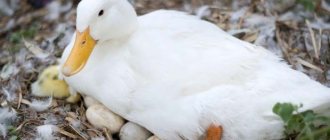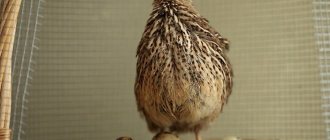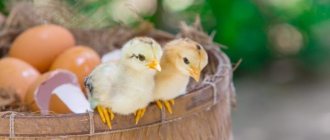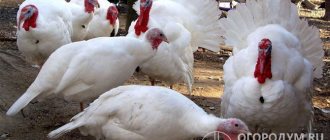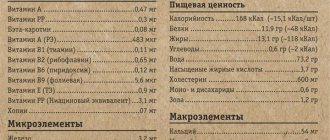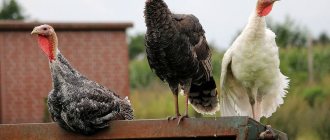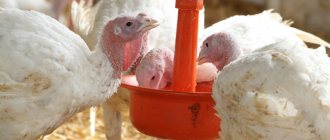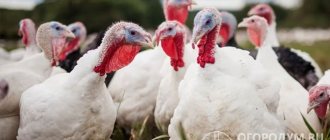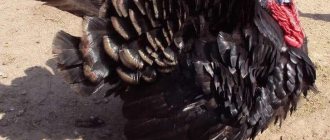Home » Articles about turkeys » How many eggs does a turkey lay?
Turkey breeding is an activity that is becoming more and more in demand every year. Healthy living conditions and properly selected food make it possible to raise poultry with high-quality, nutritious and very tasty meat, which produces large eggs that are beneficial for the human body. Every owner should know at what age turkeys lay eggs, in what quantities and under what conditions, because only with this information can maximum bird productivity be achieved.
Age of sexual maturity of turkeys
The period of sexual maturity of turkeys depends on the breed, heredity, weight category, conditions of keeping and health of the bird. Most often, turkeys begin to lay eggs at the age of 7 to 9 months. Large birds lay their first eggs at 32–36 weeks of life, and small birds lay their first eggs at 28–30 weeks.
When keeping turkeys at home, you can find out that they are ready to lay eggs by the following signs:
- The female rushes about and looks for a secluded corner, into which she begins to pull down fluff, leaves and branches.
- The laying hen does not go out for a walk in the morning.
- The turkey hides from the flock and cannot be seen in the house or yard. Most likely, she is setting up a nest somewhere.
Most often, turkeys begin laying eggs in early March and end in April.
The next stage of egg laying occurs in the fall. At home, turkey eggs can be obtained in spring and autumn .
In industrial turkey farming, birds lay eggs all year round. There, the egg production of turkeys does not depend on the time of year, weather and climate. Young turkeys show the highest egg production. When the bird reaches two years of age, the egg production rate drops.
Experienced farmers, in order to induce earlier egg laying, install additional artificial lighting . The process of molting and egg laying can be reduced by artificially reducing the length of the day.
We also recommend reading:
Quezali - the vanishing beauty of South America Gay penguins stole a nest with eggs from lesbian penguins Gray partridge - a unique assistant in gardens and fields Skillful conspirators. Why doesn't anyone see urban pigeons nesting?
Every poultry farmer should know that daylight can be extended only after turkeys and turkeys are eight months old. If you increase the amount of light when birds have not yet reached sexual maturity, you can get early clutches, but the quality of the offspring will be low and productivity in the future will decrease.
Turkeys
Usage
Turkey eggs are not sold in supermarkets along with chicken eggs. But this does not mean that they are inedible or have an unpleasant taste. In terms of nutritional value, they are second only to quail. Due to their alkaline composition, they are useful for inflammatory diseases of the gastrointestinal tract and high acidity. In the absence of individual intolerance, the product can be introduced into the daily diet by preparing omelettes, salads, baked goods and other dishes.
The reason for the lack of eggs on free sale is only the unprofitability of their production - the egg production of turkeys is lower than that of chickens, they reach sexual maturity later, and a lot of space is required to keep large birds. It is more profitable to use masonry to produce young animals.
From the moment the turkeys start laying eggs until the end of the breeding period, they hatch 40-60 poults. By the age of 5 months, the total live weight of young animals reaches 250-350 kg. Raising this bird is also considered profitable because 3-4 feed units are consumed per 1 kg of weight gain in young animals (1 unit is equivalent to 1414 kcal).
- Related Posts
- How to give tetracycline to turkeys
- Temperature for turkeys
- Newcastle disease in turkeys
- Turkeys at 3 months
- Feeders for turkeys
- How to slaughter turkeys?
Egg production of turkeys
To obtain eggs from a turkey and successfully breed offspring, you will need one male for ten females.
The turkey must be one month older than the turkeys. During mating, the male behaves quite aggressively, so to prevent him from injuring his partner, his claws are cut. Fertilization of a turkey usually occurs the first time. In the first days of laying, you can get one egg from a laying hen in a few days. After some time, turkeys lay eggs every other day or once a day. Each turkey egg weighs about 70–80 grams. The turkey egg itself has a light beige color and brown spots, and its shell is pockmarked.
What egg production a laying hen will have in a year at home depends on many indicators. These include:
- Weight and breed of bird.
- In the spring, turkeys lay eggs better than in the fall.
- The hen must live in peace and quiet, otherwise she can be scared away.
- Dampness and cold have a negative impact on turkey egg laying. The poultry house should always be dry and warm.
- Daylight should be at least ten hours a day.
- Quality and quantity of feed consumed.
When all the conditions necessary for keeping the bird are met, the laying hen’s egg production reaches 120–150 eggs per year .
Young females produce small testicles, but in larger quantities. As the turkey ages, the weight of the egg increases, however, it lays eggs less frequently. It has a bad effect on egg production and the molting period. The eggs received from the female must be collected and stored at home at a temperature of +13 to +18 degrees for no more than ten days. As soon as there are from 11 to 20 turkey eggs, they will need to be placed under the laying hen.
Possible problems
Despite the fact that turkeys are very good hens, some of them categorically refuse to hatch eggs. Turkeys may refuse to perch for several reasons:
- experienced stress;
- health problems;
- reluctance to get used to the new nest;
- poor living conditions and food.
What to do in this case and can turkeys be used as hens? If there are not enough females, many farmers use turkeys to hatch the eggs . The male is placed in the nest on an egg and covered with a basket. After a few days, the basket is removed, and if the turkey remains in place, it is used as a hen. Males that fly out of the nest will not hatch their offspring.
Possible problems
Sometimes the hen abandons the nest mid-cycle. There may be several reasons for this:
- a female is lured for a walk by a turkey;
- the bird is uncomfortable in the nest - the litter is damp, parasites are pestering, it’s too hot;
- food and water were not provided to the turkey near the nest, which is why the female is forced to leave the nest for a long time;
- individual characteristics of the bird.
As a rule, most turkeys are good brooders, but caring mothers are highly valued. A good hen, even when she stops laying eggs herself, can hatch chicks not only of turkeys, but also of chickens, guinea fowl and even ducks.
Often turkeys do not lay eggs at the height of the season, the reasons for this may be the following:
- too hot or cold (above +30 degrees or below +10);
- the duration of daylight hours in the poultry house is less than 12 hours;
- the bird is infected with parasites;
- the room is damp, poor ventilation;
- There are too many males in the herd and they tire the turkeys with courtship.
With a high level of stress and crowding (there is more than 1 bird per square meter), turkeys also stop laying eggs.
Turkey nest
During the egg-laying period, it is necessary to equip the hen with a warm perch or nest with clean and dry bedding , regularly feed the female a nutritious, complete diet with the addition of vitamins, and fulfill other conditions for good maintenance:
- When the hen begins to lay eggs, the air temperature in the house should be maintained within a range of +10 degrees. Lower temperatures will negatively affect the health of the offspring.
- In the common turkey poultry, two-tier nests are made on beams for arranging a perch. The height of each of them should be from 60 to 65 cm, and the width and length should be 50x70 cm. The bottom of the box is lined with a layer of sand extinguished with ash.
- The nest is made only from wooden boxes. Their bottom is covered with dry soil and well-dried hay.
Near the nest there must be a feeder, a drinking bowl and a container with sand and ash . Birds usually do not leave the nest with eggs for a long time and refuse fresh air, drink and water. This is bad for their health. Therefore, turkeys should be brought to the feeder, drinking bowl and taken out into the fresh air several times a day.
To prolong the clutch and increase egg production, eggs should be removed from the nest more often. To produce offspring, only eggs obtained in the spring are used. In winter, keeping young animals at home becomes more difficult.
Turkeys are distinguished by their love of cleanliness , so one of the reasons for stopping egg laying may be contamination of the nest. In this case, it should be cleaned and the old litter replaced with a new one.
Day-old chicks are placed in a separate box, at the bottom of which hay or large sawdust is placed. It is not recommended to use newspaper or paper, as babies can injure their paws. In the first week of life, chicks need round-the-clock lighting and an air temperature of +35 degrees. To do this, attach a lamp to the box, which will provide light and warmth. Young animals should be protected from drafts.
Turkey eggs - benefits and harms
The product obtained from turkey has its own characteristic properties , which can be both beneficial and harmful.
The beneficial properties of turkey eggs include the fact that the product is rich in vitamins and minerals:
- vitamins E and A are good for beauty and health;
- phosphorus and potassium are necessary for the strengthening and health of teeth, hair, and bone tissue;
- sodium normalizes water balance in the body;
- B vitamins relieve fatigue and normalize sleep;
- potassium strengthens blood vessels and heart muscle;
- Iodine is necessary for enhancing mental activity and good functioning of the thyroid gland.
Turkey eggs are second only to quail eggs in terms of nutritional value.
The balanced set of vitamins and minerals included in the turkey product normalizes the body's metabolism and strengthens the immune system. Raw eggs are good for the stomach. It envelops and protects the mucous membrane from increased acidity. Even the nervous system will begin to work well if you eat turkey eggs. When used, there is minimal possibility of allergies, so turkey testicles are practically safe for people prone to allergies and small children. It is not recommended to include turkey eggs in the diet for the following pathologies and conditions:
- elevated cholesterol levels;
- use of food diets and excess weight;
- individual intolerance of the body to protein or yolk;
- kidney and liver problems.
It is recommended to buy the product only with whole shells and from trusted farmers or stores, since eggs can be a source of salmonella.
Application and storage
On the farm, this delicious product is used in the same way as chicken eggs. You can use it to prepare fried eggs, omelettes, a variety of salads and delicious desserts. Before use, eggs are boiled in water for ten minutes . They can be used to prepare dough and soufflé base.
Cosmetologists recommend including the product in masks for hair, body, and face.
The shell of such testicles has a loose structure, so various odors easily penetrate through it. In this regard, in the refrigerator, eggs should be isolated from other products , especially those that have strong odors. It can be citrus fruits, onions, garlic, spices, fish. To prevent odor from penetrating inside the eggs, they are treated with a solution of linseed, sunflower oil and paraffin.
Nutritionists recommend using no more than one turkey egg per day .
Turkeys are fairly unpretentious birds, so even a novice poultry farmer can keep them at home.
By providing the birds with comfortable living conditions, a clean house, sufficient food and walks, you can get high-quality meat, healthy eggs and healthy offspring from turkeys.
